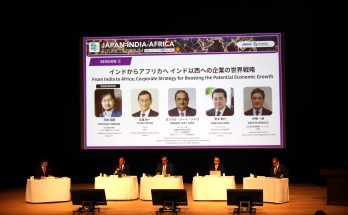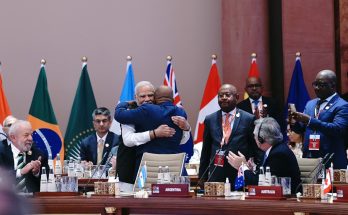 At the beginning of the year, Japanese Prime Minister Shinzo Abe made a trip to Africa, visiting Ethiopia, Ivory Coast and Mozambique. This was the first visit by a Japanese Prime minister to Africa in eight years. Mr Abe emphasised the significance of this tour, describing it as “a large springboard for Japan and Africa to be partners of growth in the 21st century”.
At the beginning of the year, Japanese Prime Minister Shinzo Abe made a trip to Africa, visiting Ethiopia, Ivory Coast and Mozambique. This was the first visit by a Japanese Prime minister to Africa in eight years. Mr Abe emphasised the significance of this tour, describing it as “a large springboard for Japan and Africa to be partners of growth in the 21st century”.
However, Japan has lagged behind China in showing its presence in the African continent in recent years. According to the International Monetary Fund (IMF), China’s trade with Africa hit 138.6 billion dollars last year, far outstripping the 30-billion-dollar bilateral trade partnership between Japan and Africa.
Mr Abe is keen to capitalise on the African continent’s rich natural resources and on-going economic development and has positioned Africa as a frontier for Japan to help support his economic policies, better known as Abenomics.
Looking at the tough competition, Mr Abe has urged greater transparency in business transactions and has promised to do more to protect the rights and security of some 30,000 Africans living and working in Japan.
In the current scenario, Japan desires to transfer Japanese technology and promote the spread of education in Africa. It will help in the private sector development in Africa and double the amount of low-interest yen loans to African countries to $2 billion over five years as compared to $1 billion over five years, set in 2012. Assistance of approximately US$320 million will be given to Africa by Japan to respond to conflicts and disasters in the continent.
As a part of Japan’s US $320 million assistance for Africa, US $3 million will be in support for the African-led International Support Mission to the Central African Republic. An assistance of US $25 million will be given to respond to the deteriorating situation in South Sudan.
J apan is also working with France to counter China’s rising influence in the continent. Japan will support ongoing French wars in two former French colonies, Mali and the Central African Republic (CAR). Japan contributed 735 million Euros for the French military intervention in Mali.
apan is also working with France to counter China’s rising influence in the continent. Japan will support ongoing French wars in two former French colonies, Mali and the Central African Republic (CAR). Japan contributed 735 million Euros for the French military intervention in Mali.
Japan has also signed an agreement with Ethiopia to introduce direct flights between the two countries. This is expected to increase the flow of people between the two countries.
During his visit to Africa, Mr Abe was joined by executives from more than 20 companies. Japan sees Africa as its new overseas market for selling cars, power plants and generators and buy fuel and other raw material.
Japan has high expectation also from Mozambique where some of the world’s largest gas fields were discovered since around 2011. Japan has been seeking new energy sources after the Fukushima nuclear disaster. The estimated gas reserves in Africa are set at 100 trillion cubic feet, which represent more than 20 percent of annual gas consumption in Japan. According to Taira Nozaki, general manager of major trading company Mitsui & Co, office in Mozambique, “There is a possibility that this could become the third major (LNG) centre behind Qatar and Australia”.
Japan also has plans to develop agricultural lands in Mozambique. Project ProSAVANA is a major project being promoted in northern Mozambique, where an area of about 11 million hectares will be turned into a major grain production site.
Besides Japan’s interest in Africa’s resources, a major reason for its investment plans and agricultural land development are the moves made by China. According to a U.S. research organisation, AidData, China invested $75 billion in Africa for various development projects between 2000 and 2011. The investment was in not only resources development but also construction of roads and harbours, as well as in the fields of finance, retailing, education and medicine. Also, more than a million Chinese are estimated to be living in Africa. This is hundred times more than the number of Japanese living in the continent.i
For Mr Abe, making Japan’s presence felt is not an easy task. A major reason for this is Japan’s relative political instability and rapid turnover of prime ministers between 2006 and 2011. Now “Japan has finally managed to engage in serious diplomacy with the entire Middle East region because of the establishment of a stable government” says Kunihiko Miyake, foreign-affairs analyst at the Tokyo-based Canon Institute for Global Studies and a former senior official at Japan’s Foreign Ministry.ii
According to David Shinn, professor of international relations at George Washington University and a former US ambassador to several African countries, the trip by Mr. Abe to Africa was a “belated recognition” and that Japan was “falling behind a number of rising countries in Africa”, including China, India, Brazil, South Korea and Turkey.iii
Prime Minister Abe’s renewed engagement in Africa is seen as a part of his broader effort to put an assertive stamp on Japan’s foreign policy. Since he came back to power, Mr Abe has made one overseas trip a month almost, more than his recent predecessors. However, many analysts have cautioned that the Japanese push in Africa has its limits. China has already invested billions of dollars in the region besides soft loans that have financed railways, power plants and other infrastructure projects across Africa.
Will Mr. Abe’s African Safari pay off? Can Japan have the same amount of influence in the continent as its arch rival China? Only time will tell.
(The writer is a Research Intern at Observer Research Foundation, Delhi)
Courtesy – ORF
Author Profile
- India Writes Network (www.indiawrites.org) is an emerging think tank and a media-publishing company focused on international affairs & the India Story. Centre for Global India Insights is the research arm of India Writes Network. To subscribe to India and the World, write to editor@indiawrites.org. A venture of TGII Media Private Limited, a leading media, publishing and consultancy company, IWN has carved a niche for balanced and exhaustive reporting and analysis of international affairs. Eminent personalities, politicians, diplomats, authors, strategy gurus and news-makers have contributed to India Writes Network, as also “India and the World,” a magazine focused on global affairs.
Latest entries
 India and the WorldJune 26, 2025Operation Sindoor: India Sheds Restraint, Rediscovers Utility of Force
India and the WorldJune 26, 2025Operation Sindoor: India Sheds Restraint, Rediscovers Utility of Force India and the WorldJune 23, 2025BRICS summit in Rio to focus on Global South, local currency trade
India and the WorldJune 23, 2025BRICS summit in Rio to focus on Global South, local currency trade Africa InsightsJune 11, 2025New Opportunities in India-Japan Cooperation in Africa
Africa InsightsJune 11, 2025New Opportunities in India-Japan Cooperation in Africa India and the WorldMay 23, 2025Post-Operation Sindoor, India reminds Turkey, China of concerns and sensitivities
India and the WorldMay 23, 2025Post-Operation Sindoor, India reminds Turkey, China of concerns and sensitivities







